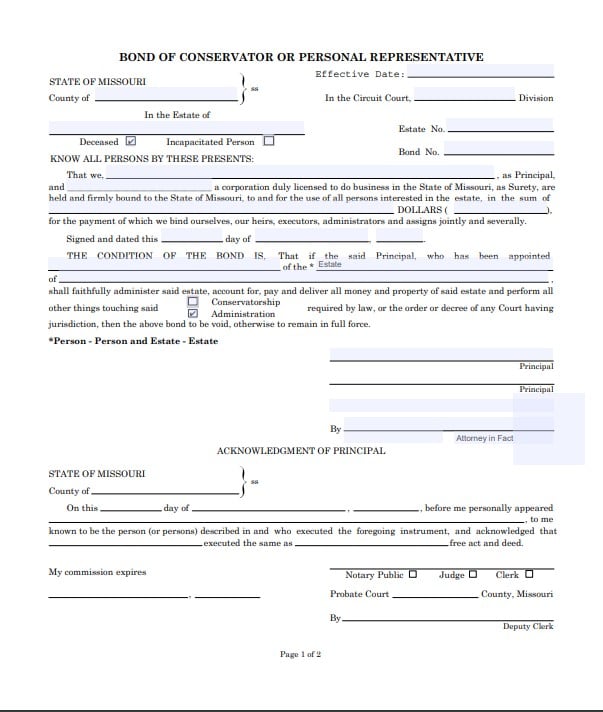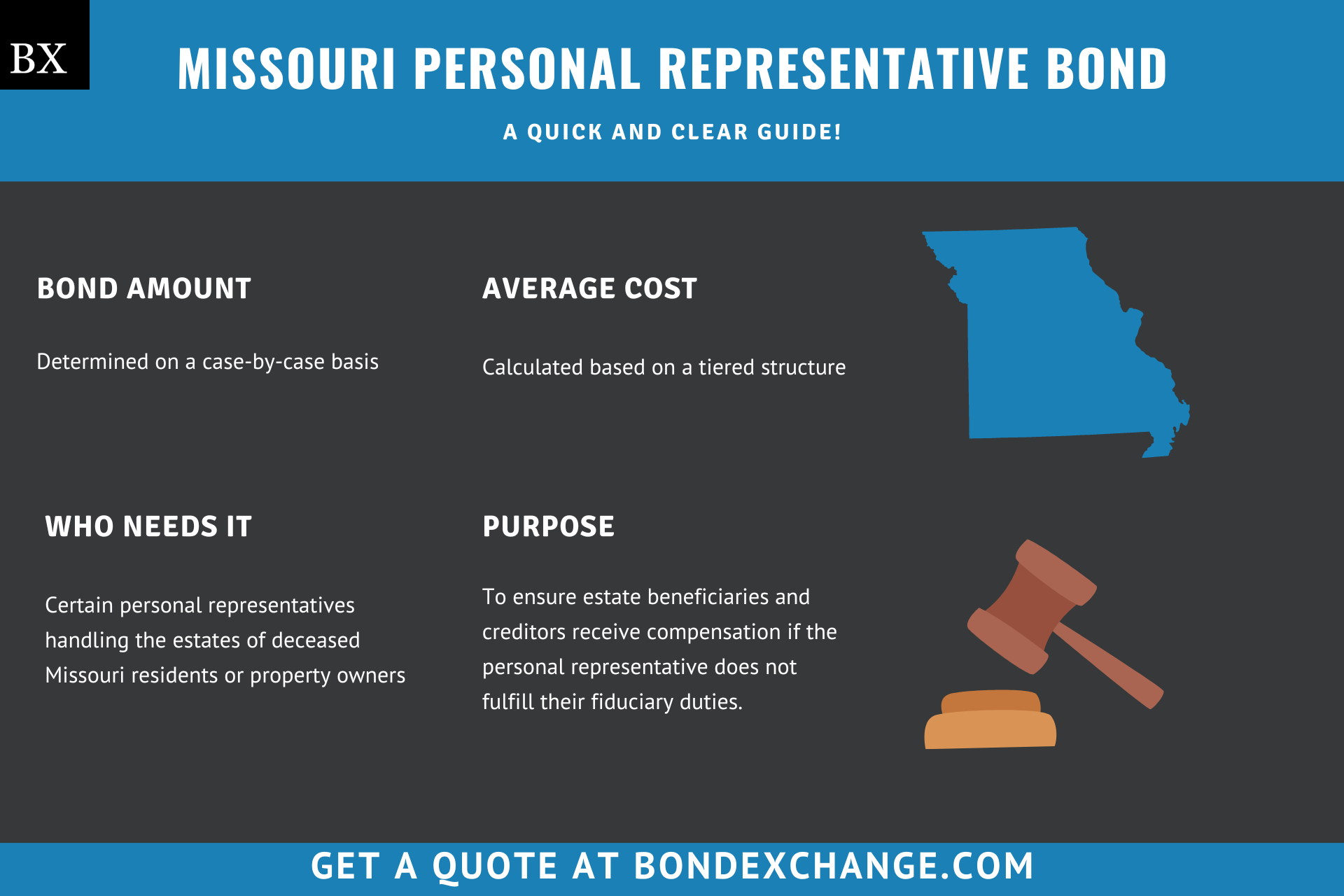Missouri Personal Representative Bond: A Comprehensive Guide
This guide provides information for insurance agents to help their customers obtain a Missouri Personal Representative bond.
At a Glance:
- Average Cost: Calculated based on a tiered structure
- Bond Amount: Determined on a case-by-case basis (more on this later)
- Who Needs it: Certain personal representatives handling the estates of deceased Missouri residents or property owners
- Purpose: To ensure estate beneficiaries and creditors receive compensation if the personal representative fails to fulfill their fiduciary duties
- Who Regulates Personal Representatives in Missouri: The circuit court with jurisdiction over where the deceased individual resided or had property

Background
Missouri Statute 437.017 requires all personal representatives of an estate to be appointed by a court before assuming their fiduciary duties. The Missouri legislature enacted the appointment requirement to ensure that personal representatives do not mismanage the estate’s assets. To provide financial security for the enforcement of this requirement, the court may require the personal representative to purchase a probate surety bond to be eligible for appointment.
What is the Purpose of the Missouri Personal Representative Bond?
Missouri requires personal representatives to purchase a surety bond as a prerequisite to being appointed as a fiduciary over an estate’s assets. The bond ensures that the estate’s beneficiaries and creditors will receive compensation for financial harm if the personal representative fails to abide by the regulations outlined in Missouri Statute 473.157. Specifically, the bond protects beneficiaries and creditors if the personal representative engages in fraud or fails to properly distribute the estate’s assets. In short, the bond is a type of insurance that protects the estate’s beneficiaries and creditors if the personal representative violates their fiduciary duties.
How Can an Insurance Agent Obtain a Missouri Personal Representative Surety Bond?
BondExchange makes obtaining a Missouri Personal Representative bond easy. Simply login to your account and use our keyword search to find the “Probate” bond in our database. Don’t have a login? Gain access now and let us help you satisfy your customers’ needs. Our friendly underwriting staff is available by phone (800) 438-1162, email or chat from 7:30 AM to 7:00 PM EST to assist you.
At BondExchange, our 40 years of experience, leading technology, and access to markets ensures that we have the knowledge and resources to provide your clients with fast and friendly service whether obtaining quotes or issuing bonds.
Not an agent? Then let us pair you with one!

Click the above image to find a BX Agent near you
How is the Bond Amount Determined?
Missouri Statute 473.157 grants the court the authority to set the required bond amount on a case-by-case basis. When determining the required amount, the court will consider factors such as the estate’s total value as well as the income it is expected to generate during the administration period. The bond amount may be reduced by the value of the estate’s assets deposited with a depository institution that prevents its unauthorized disposition. The court may increase or reduce the required amount as it sees fit.
What are the Underwriting Requirements for the Missouri Personal Representative Bond?
Most surety companies will examine the following factors when determining eligibility for the Missouri Personal Representative bond:
- Personal representative’s credit history (not considered for bonds with limits less than $25,000)
- Whether or not the estate has an attorney (not considered for bonds with limits less than $25,000)
- How long the fiduciary appointment is for
- Whether or not the personal representative is replacing a prior fiduciary
- If the personal representative has ever committed a felony
- If there are disputes among the estate’s beneficiaries
- Whether or not there is any ongoing business in the estate
- If the bond is being required by a creditor
How Much Does the Missouri Personal Representative Bond Cost?
Surety companies typically determine the premium rate for personal representative bonds based on a tiered structure. As a result, larger bond amounts will be charged a lower premium rate than smaller bonds.
The following table illustrates the pricing structure for the Missouri Personal Representative bond:
$1,500,000 Personal Representative Bond Cost
| Bond Amount | Premium Rate | Total Bond Cost |
|---|---|---|
| First $20,000 | 0.75% | $150 |
| Next $40,000 | 0.60% | $240 |
| Next $140,000 | 0.50% | $700 |
| Next $300,000 | 0.375% | $1,125 |
| Next $1,000,000 | 0.25% | $2,500 |
| Total cost of $4,715 |
Who is Required to Purchase the Missouri Personal Representative Bond?
Missouri requires personal representatives to purchase a surety bond as a prerequisite to obtaining a fiduciary appointment. To paraphrase Missouri Statute 472.010, a personal representative is a court-appointed fiduciary responsible for administering a deceased individual’s estate. Personal representatives are referred to as executors if the deceased individual nominated them in their will (testate), and administrators if they were not nominated if no will exists (intestate).
Personal representatives are not required to purchase a bond if:
- The will explicitly waives the bond requirement
- They are a bank or trust company authorized to act as a fiduciary in Missouri
- The court determines that a bond is not neccessary
The court may at any time require an exempt personal representative to purchase a bond.

How do Personal Representatives Become Appointed in Missouri?
Personal representatives in Missouri must navigate several steps to become court-appointed fiduciaries. Below are the general guidelines, but applicants should refer to Missouri’s probate code for details on the process.
Step 1 – Meet the Qualifications
Personal representatives are ineligible for appointment if they are:
-
- A full-time judge, clerk, deputy clerk, or division clerk unless they are the spouse of the deceased individual or related to them in the third-degree
- Under the age of 18
- Of unsound mind
- Under legal disability as a result of a conviction of a crime
- A habitual drunkard
- An out-of-state company, except those listed under Missouri Statute 437.117
Step 2 – Determine Priority
Priority for appointment as a personal representative is granted in the following order:
-
- To executors nominated in the will
- The surviving spouse
- Estate beneficiaries the court deems best suited to administer the estate (conservators of the deceased individual are not given priority)
- Any other qualified person
- Persons nominated by an executor or the surviving spouse
When two or more persons share priority, one (or more if more than two people share priority) must either renounce their right to administer the estate or all must agree on someone to nominate.
Step 3 – Hire an Attorney
Although not explicitly required, it is highly recommended that personal representatives hire an attorney to assist with the probate process.
Step 4 – Determine the Estate Administration Type
Missouri has three distinct estate administration types, as outlined below:
-
- Independent: The personal representative is able to administer the estate with minimal court supervision. Independent administration may commence when the will explicitly allows it or all estate beneficiaries consent to it and the will does not prohibit it.
- Supervised: The personal representative is under the supervision of the court when administering the estate.
- Small: A much simpler process where the estate’s property may be distributed via an affidavit. Small estate administration is available to estates that are not worth more than $40,000 and do not have any pending applications for the appointment of a personal representative.
Step 5 – Contact the Court
Personal representatives must contact the circuit court with jurisdiction over the deceased individual’s estate. An employee of the court will walk the personal representative through the appointment process, provide them with all required forms, and answer any questions they may have.
Step 6 – Purchase a Surety Bond
Unless otherwise exempt, personal representatives must purchase and maintain a surety bond (limits outlined above).
How do Missouri Personal Representatives File Their Bonds?
Personal representatives should submit their completed bond forms, including the power of attorney, to the county court with jurisdiction over the estate.
The surety bond requires signatures from the company that issues the bond and the personal representative. The surety company should include the following information on the bond form:
- Court where the bond will be filed
- Date the bond goes into effect
- Name of the deceased individual
- Legal name of the entity/individual(s) buying the bond
- Surety company’s name
- Bond amount
- Date the bond is signed
What can Missouri Personal Representatives do to Avoid Claims Made Against Their Bonds?
To avoid claims against their bonds, personal representatives in Missouri must ensure that they:
- Properly distribute the estate’s assets
- Do not commit fraud
- Fulfill their fiduciary duties
